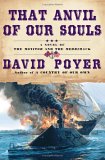Summary | Excerpt | Reviews | Read-Alikes | Genres & Themes | Author Bio

A dazzling nautical adventure that finds ensign Richard Sharpe in the middle of one of history's most spectacular naval engagements: the 1805 Battle of Trafalgar.
A dazzling nautical adventure that finds Bernard Cornwell's beloved ensign Richard Sharpe in the middle of one of history's most spectacular naval engagements: the battle at Cape Trafalgar off the coast of Spain.
The year is 1805, and Richard Sharpe, having completed his tour in India (Sharpe's Tiger; Sharpe's Triumph; Sharpe's Fortress), is headed back to England, where he will join a newly formed regiment, the Green Jackets. Traveling aboard Captain Peculiar Cromwell's East Indiaman cargo ship, the Calliope, is the lovely Lady Grace Hale, whose regal presence may provide intrigue and distraction from what promises to be an otherwise uneventful voyage home.
But nothing is uneventful in the life of Richard Sharpe, even at sea: the Calliope is captured by a formidable French warship, the Revenant, which has been terrorizing British nautical traffic in the Indian Ocean. The French warship races toward the safety of its own fleet, carrying a stolen treaty that, if delivered, could provoke India into a new war against the British -- and render for naught all that Sharpe has fought for so bravely till now. But help comes from an unexpected quarter. An old friend, a captain in the Royal Navy, is on the trail of the Revenant, and Sharpe comes aboard a 74-gun man-of-war called Pucelle in hot pursuit.
Then Admiral Horatio Nelson arrives, with his magnificent fleet of twenty-seven. What results is a breathtaking retelling of one of the most ferocious and one-sided sea battles in European history, in which Nelson -- and Sharpe -- vanquish the combined naval might of France and Spain at Trafalgar.
The Economist
The direct heir to Patrick O'Brian.

If you liked Sharpe's Trafalgar, try these:

by Mark Helprin
Published 2024
Mark Helprin, the #1 New York Times bestselling author of Winter's Tale and A Soldier of the Great War, presents a fast-paced, beautifully written novel about the majesty of the sea; a life dedicated to duty, honor, and country; and the gift of falling in love.

by David Poyer
Published 2006
In the third volume of David Poyer's monumental Civil War at Sea cycle, North meets South in the momentous first battle between ironclads.
Dictators ride to and fro on tigers from which they dare not dismount. And the tigers are getting hungry.
Click Here to find out who said this, as well as discovering other famous literary quotes!